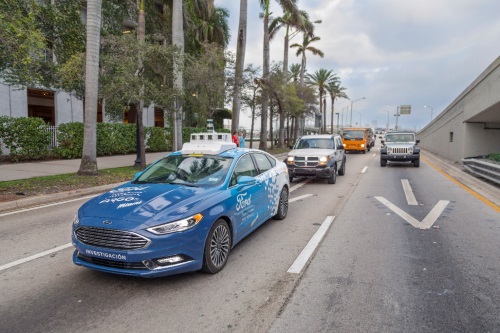Oft-delayed legislation sponsored by Sen. John Thune, R-South Dakota, designed to promote broader adoption of connected-autonomous vehicles or CAVs, may be attached to an updated version of the Senate’s Federal Aviation Administration reauthorization bill – an effort that is encountering pushback from a number of safety advocacy organizations.
The Senate Committee on Commerce, Science and Transportation originally passed the “American Vision for Safer Transportation through Advancement of Revolutionary Technologies” or AV START Act by a unanimous voice vote on October 2017, but five Democratic Senators subsequently blocked it from being brought before the full Senate for a vote at that time.
Now, some 70 different groups signed a letter sent to the members of the Committee to keep the AV STASRT Act from being added as a rider to the FAA bill, as it will “likely set policy on driverless cars for decades to come and as such, comprehensive safeguards, sufficient government oversight, and industry accountability are essential. [But] the bill, in its current form, fails to provide these minimal safety protections.”

Photo: Ford Motor Co.
The letter – signed by a diverse array of organizations including Public Citizen, Advocates for Auto and Highway Safety, the Emergency Nurses Association, the National Association of Police Organizations, and the League of American Bicyclists – said pushing the AV START Act through by tacking it onto a “must-pass” bill would “circumvent the regular legislative process and cut it off from full debate, discussion, transparent consideration, and the offering of amendments.”
It added that the National Transportation Safety Board has several open investigations of CAV-related incidents that “will produce findings likely to have a direct bearing on the AV START Act. The bill should not be advanced, especially as a rider on the FAA bill, until those investigations are complete and critically-needed changes are made to ensure safety.”
By contrast, a letter of support issued by ITS America on July 23 noted that the AV START Act “creates a federal framework” for CAV development and deployment, as well as “reinforcing state and local roles by maintaining their authority” over the operation of CAVs on public roads.
[Side note: Bill Panos, director of the Wyoming DOT, discussed the benefits and challenges posed by CAVs in testimony before the Senate Committee on Environment and Public Works on June 13.]
“The bill establishes a process in which developers can apply to the National Highway Traffic Safety Administration to demonstrate that features of their products provide an equivalent level of safety to those required by Federal Motor Vehicle Safety Standards,” ITS America’s letter said.
“One of the most important aspects of the AV START Act is that it requires NHTSA to develop FMVSS for self-driving vehicles on an expedited basis,” it added. “This is necessary because the automobile and technology industries need experience operating these vehicles in sufficiently substantial numbers to generate the broad data across a multitude of scenarios and environmental operating conditions necessary to ensure safety.”
Finally, the group noted that 37,461 people died in U.S road crashes in 2016 – an increase of 5.6 percent from 2015 – and that CAV technology can help reduce such fatalities. “These technologies have the potential to eliminate the 94 percent of crashes caused by human error,” its letter said.
At the state level, efforts to support the development of CAVs continues at a much faster pace. The National Conference of State Legislatures, for example, noted in June that since 2012 at least 41 states and the District of Columbia have “considered legislation” related to CAVs, with 29 actually enacting legislation related to them.



